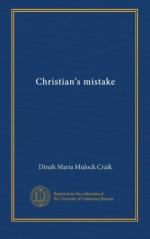“Papa, we never thought you heard us. We thought when you were deep in that big book you heard nothing.”
“Indeed? Very well” said papa, and disappeared below the surface again, until he revived to take out his watch and observe that it was nearly time for little people to be safe asleep in their little beds.
Papa was always unquestioningly and instantaneously obeyed, so the young trio ceased their laughing over their funny songs, and prepared for one—a serious one—which always formed the conclusion of the night’s entertainments.
Every body knows it; most people have been taught it, the first song they were ever taught, from their mother’s lips. Christian had learned it from her mother, and it was the first thing she taught to these her children—the Evening Hymn—“Glory to Thee, my God, this night.”
She had explained its meaning to them, and made them sing it seriously—not carelessly. As they stood round the piano, Titia and Atty one at each side, and Oliver creeping in to lean upon his step-mothers knee, there was a sweet grave look on all their faces, which made even the two eldest not unpretty children; for their hearts were in their faces—their once frightened, frozen, or bad and bitter hearts. They had no need to hide any thing, or be afraid of any thing. They were loved. The sunshine of that sweet nature, which had warmed their father’s heart, and made it blossom out, when past life’s summer, with all the freshness of spring, had shined down upon these poor little desolate, motherless children, and made them good and happy—good, perhaps, because they were happy, and most certainly happy because they were good.
For that mother—their real mother, who, living, had been to them—what Christian never allowed herself to inquire or even to speculate—she was gone now. And being no longer an imperfect woman, but a disembodied spirit—perhaps—who knows?—she might be looking down on them all, purified from every feeling but gladness; content that her children were taken care of and led so tenderly into the right way.
Clear and sweet rose up their voices in the familiar words, over which their step-mother’s voice, keeping them all steady with its soft undertone, faltered more than once, especially when she thought of all the “blessings” which had to come to herself since the dawning “light:”
"Glory to Thee, my God,
this night,
For all the blessings
of the light.
Keep me, oh keep me,
King of kings,
Beneath Thine own almighty
wings!"
The strain had just ended—as if he had waited for its ending—when the drawing-room door opened, and there entered for the second time into the family circle at the Lodge—Sir Edwin Uniacke.
Certainly the young man was no coward, or he never would have entered there. When he did so, bold as he looked, with his easy “fast” air, his handsome face flushed, as if with just a little too long lingering over wine, he involuntarily drew back a step, apparently feeling that the atmosphere of this peaceful home was not fitted for him, or that he himself was not fitted to be present there.




